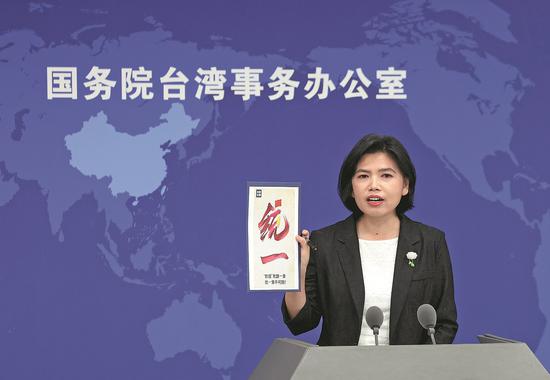Taiwan celebrities show support for reunification

Zhu Fenglian, spokeswoman for the State Council Taiwan Affairs Office, displays a reunification poster from China Central Television at a news conference in Beijing on Wednesday. (ZHANG YU/CHINA NEWS SERVICE)
The recent move by some Taiwan celebrities to circulate a poster on social media expressing support for reunification with the mainland reflects their recognition of their Chinese identity, a spokeswoman of the Chinese mainland said on Wednesday.
A number of Taiwan entertainers have reposted the poster that was first uploaded by China Central Television last week and which states that Taiwan's reunification with the mainland is unstoppable.
The move by the celebrities comes after the new leader of the Taiwan region, Lai Ching-te, blatantly advocated "Taiwan independence" in his "inaugural address" earlier this month.
Many entertainers from Taiwan have also been using the term "we "on a number of occasions to express their stance on the Taiwan question. Ashin, the lead singer of renowned Taiwan rock band Mayday, said during a concert in Beijing last week, "We Chinese, when we come to Beijing, we must eat Peking duck."
Zhu Fenglian, a spokeswoman for the State Council Taiwan Affairs Office, said at a news conference in Beijing that in recent days, nearly 100 Taiwan celebrities have expressed their views on cross-Strait relations and their Chinese identity through various channels and platforms.
Some have reposted the reunification poster, which has garnered over 1.8 billion views on Weibo and has been reposted over 17 million times, Zhu said.
"Some entertainers have shared stories learned from their elders about their mainland ancestral origins, while others have expressed the desire for increased exchanges as both sides of the Taiwan Strait are part of the Chinese nation," she said, adding that "these expressions are genuine and heartfelt".
The Democratic Progressive Party authorities on the island, however, accused the mainland of pressuring the celebrities into making such statements. Lai of the DPP urged people to "understand and forgive them".
Reacting to Lai's statement, Hsiao Hsu-tsen, executive director of the Ma Ying-jeou Foundation, said, "People on both sides of the Taiwan Strait are Chinese, so since when has it become a matter that needs to be forgiven to call ourselves Chinese?"
Both sides have the tradition of respecting their ancestors, worshiping Mazu, a sea goddess, and Guan Gong, a legendary figure, and both sides belong to the Chinese nation, he said. "What's wrong in artists like Ashin saying this," he asked.
Zhu, the spokeswoman, condemned Lai and the DPP for exploiting the situation for political gain, exacerbating cross-Strait tensions, and unfairly accusing the celebrities of making "forced statements".
It showed that the DPP administration is intensifying efforts to stifle the voices of Taiwan residents, she said.
